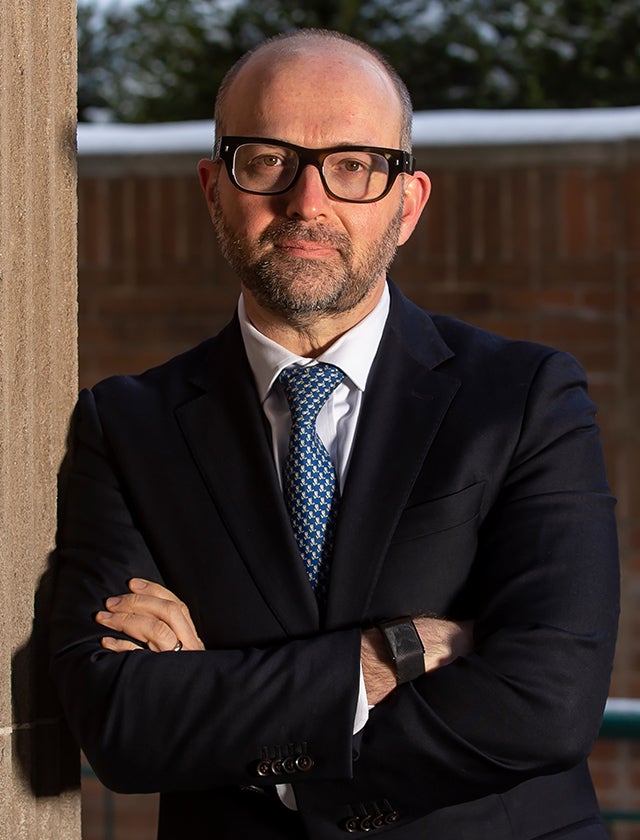
Subscribe to Pittwire Today
Get the most interesting and important stories from the University of Pittsburgh.A urologist and mentor who’s closing equity gaps in health care.
From the rural corners of Pennsylvania to operating rooms in Rwanda, Ben Davies is committed to addressing inequities in health care.
His varied research interests — studying treatment disparities in muscle-invasive bladder cancer, trends in opioid prescribing after ureteroscopy, and the variation between cash fees and hospital insurance, just to name a few — are all united under the banner of health services research. That is, studies that take a wide-angle look at how patients receive care, identify challenges in accessibility, and determine what it might take to improve the local and national policies to address those challenges.
Davies, a professor of urology in the School of Medicine and the chief of the urology section at the UPMC Hillman Cancer Center, is currently leading a study based on interviews with more than 50 physicians examining how urologists can improve treatment experiences for rural patients. Some of the solutions are obvious, he said.
“We all know that there is a need to keep funding telehealth both at the federal and state level; transportation issues and the cost of out-of-pocket expenses are also factors.”
But Davies also cautions that identifying the forces behind inequities is not clear cut.
“We’ve seen that race is a complicated issue in urology. For many years we thought that rates of prostate cancer were much worse in African American communities. In the past three or four years, we’ve realized the differences in outcomes are not driven by race, but instead, access to care and socioeconomics — the whole concept of race as a single issue in urology has been turned on its head,” said Davies, who serves on the American Urological Association Diversity and Inclusion Task Force.
In the summer of 2022, Davies and Bruce Jacobs, assistant professor in the Department of Urology, co-founded the urology health services division at Pitt, an initiative to not only bolster resources and increase research capacity but also to recruit, develop and retain students belonging to traditionally underrepresented groups in urology. The end goal of the division: improve the delivery, access and quality of urologic treatment.
Building lasting relationships
Davies’ drive to increase equity in health care took him far from home in August. A 23-hour plane ride landed him in Kigali, Rwanda, where he, Mike Stencel, a urologic oncology fellow, and Rob Turner, assistant professor of urology, spent a week volunteering with International Volunteers in Urology, a nonprofit dedicated to training surgeons based in low-resourced countries.
The organization’s model is a sustainable approach to surgical teaching, said Davies, who also serves on the group’s board. Though his cohort performed much-needed operations while in Rwanda, the driving purpose of their visit was to build the skillsets of the residents who will, in turn, train their future colleagues.
Davies scheduled follow-up meetings over Zoom with the physicians he mentored, and he plans to return to Rwanda annually.
“The idea is to maintain a presence in the country — we’re dedicating ourselves to establishing a real liaison,” he said.
He pointed to the effects of the 1994 Rwandan genocide on the country’s health care infrastructure and educational pipeline.
“Intellectuals were targeted in the genocide, and many physicians were either killed in hospitals or left the country, so there’s an age gap in the medical field. At 48 years old, I was one of the oldest physicians in the hospital,” he said.
“Dr. Davies is one of our biggest advocates and is at the forefront of making people aware of International Volunteers in Urology. In addition to being a phenomenal surgical volunteer, he takes the time to reach out to his network to fundraise,” Danielle D. Sweeney, executive director of the nonprofit.
A mentor’s impact
For Nathan Hale, being named Davies’ urologic oncology fellow in 2015 was kismet.
Matching with a fellowship program is like online dating, he said. Potential fellows are ranked and matched with programs based on compatibility.
“When I sat down and interviewed with him, I knew immediately that he and Pitt were the perfect fit for me,” said Hale.
He credits Davies’ influence with his decision to practice in Charleston, West Virginia, where he lives today.
During his fellowship, he contributed to Davies’ research on treatment disparities created by travel distance.
“West Virginia is largely rural, and the vast majority of my patients travel far to see me,” he said. Hale’s time at Pitt prepared him to serve those populations.
Davies’ mentoring style is humility tempered with humor, said Hale. Five years since his fellowship concluded, he still recalls a moment of encouragement he received in the operating room.
After performing a robotic prostatectomy for the first time unassisted, he recalled Davies’ saying, “Man, this is why I love teaching fellows.”
“It was confidence-boosting at the exact right moment and the same token, underscoring how much responsibility he takes on in training me,” said Hale.
“We had a few very beautiful years of operating together.”
— Nichole Faina



